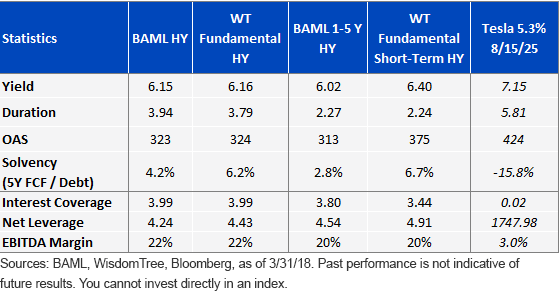Tesla may be a great company that builds exciting cars, but we wonder if investors are being compensated enough to lend Tesla money. Given its current state of production, Tesla burns mountains of cash and has routinely undershot guidance on delivering cars to eager customers. As a result, free cash flow has been negative since the inception of the business. When companies eventually run out of cash due to persistent negative free cash flow, they have only a limited set of options to avoid distress: sell something (new equity, assets or presale of vehicles) or borrow more money (via loans, term debt, revolvers).
When WisdomTree created our fundamental high-yield (HY) bond Indexes1, we sought to focus on free cash flow as the primary determinant to avoid the pitfalls of market cap weighting. Interestingly, these Indexes avoid Tesla given its persistent negative free cash flows. We examine the characteristics of Tesla's bonds compared to broad high-yield bond indexes2 and then highlight why, at this stage of the credit cycle, it makes sense to favor a fundamental discipline like the one WisdomTree developed.
Fixed Income Characteristics & Fundamentals

Each of the WisdomTree strategies has a significant premium over market cap for our measure of solvency, five-year free cash flow over debt, and maintains attractive yields. Our short-term strategy is yielding 35 basis points (bps) more than the respective market cap index.
Tesla has a bond maturing in August 2025, with a yield of 7.15% and a duration of 5.81. The yield compensation in Tesla's bond is not currently pricing too dire an economic situation for Tesla. While Tesla may ultimately turn things around, it will not qualify for inclusion in our fundamental fixed income Indexes unless its free cash flow situation improves markedly. When compared to the broader high-yield bond market, we believe increasing quality at this point in the credit cycle could be prudent.



